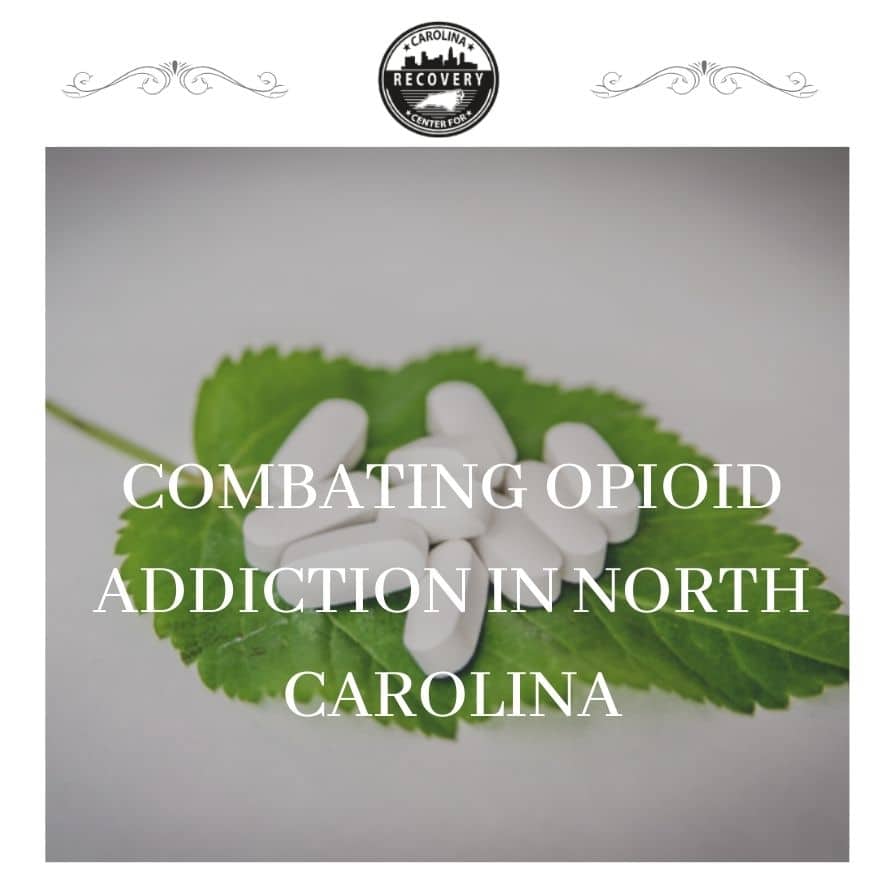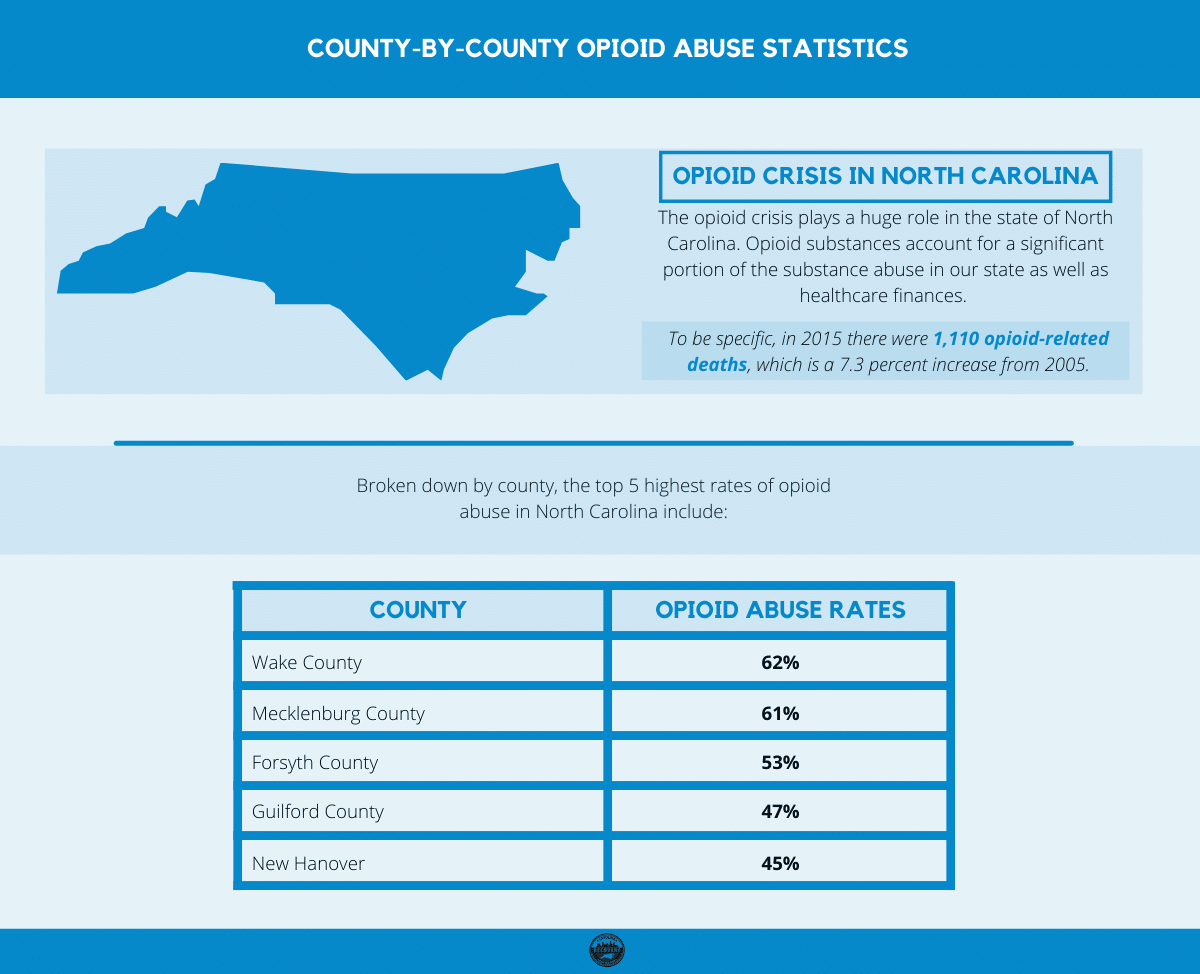Combating Opioid Addiction in North Carolina

Medically Verified: 2/1/24
Medical Reviewer
Chief Editor

All of the information on this page has been reviewed and verified by a certified addiction professional.
Opioids are a class of powerful, dangerous, and habit-forming drugs. This category of drugs includes both natural and semisynthetic substances that are derived from the opium poppy plant. For example, common forms of opioids include hydrocodone, oxycodone, morphine, heroin, and opium. Most opioids are used medicinally, as they are able to treat moderate to severe pain. On the other hand, some variations of opioids have no medicinal uses, such as heroin.
Unfortunately, many individuals abuse and become addicted to both medicinal and illicit forms of opioids. In fact, opioids are among the most commonly abused prescription drugs in our country. This is because opioid drugs cause a euphoric high that recreational users quickly become dependent upon. Also, individuals may become addicted to opioids regardless of their reasoning for using the substance. For example, a person who is prescribed oxycodone for pain can easily become addicted to the medication through repeated, long-term use.
Opioid addiction has become an epidemic in the United States. Sadly, North Carolina has been no exception. In fact, North Carolina is considered to be one of the states with the highest rates of opioid abuse in the country. According to public health data, 4 out of 25 of the cities with the highest opioid abuse rates are located in North Carolina. With that being said, opioid addiction is a serious issue in the local community. If you or a loved one suffer from opioid addiction, it may be time to seek professional opioid addiction treatment.
Opioid Addiction Statistics in North Carolina
To fully understand the gravity of opioid addiction in North Carolina, it’s best to break down the rates of abuse by city or county. Unfortunately, these numbers accurately display the reasons behind rising concerns of doctors, researchers, families, and citizens of North Carolina. For example, Wilmington has the highest rates of opioid abuse in the country, at 11.6 percent. Hickory, North Carolina, is not much farther behind, ranking fifth in the country at 9.9 percent. These numbers are concerningly high, especially when compared to some of the neighboring states.
County-by-County Opioid Abuse Statistics

The opioid crisis plays a huge role in the state of North Carolina. Opioid substances account for a significant portion of the substance abuse in our state as well as healthcare finances. To be specific, in 2015 there were 1,110 opioid-related deaths, which is a 7.3 percent increase from 2005.
Broken down by county, the top 5 highest rates of opioid abuse in North Carolina include:
- Wake County – 62%
- Mecklenburg County – 61%
- Forsyth County – 53%
- Guilford County – 47%
- New Hanover – 45%
Unfortunately, these numbers are increasing rapidly on a yearly basis. Thankfully, citizens of North Carolina have the opportunity to attend professional opioid addiction treatment. If individuals continue to attend drug and alcohol rehab and achieve long-term sobriety, these numbers could decrease over time.
Why Don’t Opioid Addicts Just Quit On Their Own?
Opioids such as hydrocodone, oxycodone, morphine, codeine, fentanyl, and heroin are known for their highly addictive properties. When an individual uses opioids frequently, the substance begins to rewrite certain pathways in the brain. Individuals may believe they are in control of their opioid intake, but they aren’t. Oftentimes, people addicted to opioids find this out the hard way once they try to quit, only to develop nasty symptoms of withdrawal and extreme cravings for the substance.
Pain signals travel through the nervous system, eventually reaching the brain. The chemical in charge of soothing pain is known as dopamine. Unfortunately, individuals addicted to opioids begin to physically depend on the substance to produce dopamine. If a person suddenly stops using opioids, crushing depression begins to set in as well as additional symptoms of opioid withdrawal. Because of the uncomfortable side-effects associated with quitting opioids cold-turkey, individuals who attempt this alone typically relapse. However, attending opioid detox and addiction rehab gives individuals the tools they need to beat opioid addiction once and for all.
What is Opioid Addiction Treatment?
Individuals dependent upon a substance such as opioids are not in control of their addiction, as this issue is classified as a disease. The symptoms of opioid addiction range from physical to psychological and may be extremely difficult to cope with. However, attending opioid addiction treatment in North Carolina allows individuals to recover from the disease of addiction.
At a substance abuse treatment center, addiction experts, and mental health personnel work with patients to create a customized treatment approach. This is done to ensure that each patient’s individual needs are met.
Common therapeutic strategies to opioid addiction treatment include:
- Opioid detox – patients undergo full medical detoxification, expelling any remaining opioid substances from their bodies.
- Behavioral therapy – allows patients to reinvent the ways they react to stressors and triggers.
- Dual diagnosis assessment and treatment – treatment for individuals with a co-occurring mental health disorder on top of an opioid use disorder.
- Family counseling – allows patients and their loved ones to recover, become closer, and build a support network.
- Holistic treatment – assists patients by healing their spirit, rather than only their mind and bodies.
- Nutritional therapy and guidance – focuses on regaining helping patients to regain physical health while overcoming substance abuse
Treatment for Opioid Addiction in North Carolina
At Carolina Recovery Center, we understand the vitality of effective opioid addiction treatment in North Carolina. To combat the high rates of opioid addiction and abuse in our state, we treat our patients using only the most effective evidence-based treatment modalities, including medication-assisted detox, individual therapy, group counseling, dual diagnosis care, and much more. To learn more about opioid addiction treatment and what our program provides, contact our experienced and licensed addiction specialists today.

